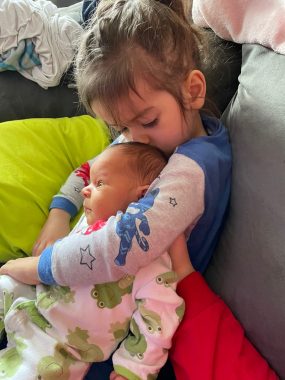How My Children’s Experiences With Newborn Screening Differ
I welcome my 2nd son, who gets much faster test results than my 1st

In the United States, every child gets tested for a multitude of rare diseases and conditions at birth. However, each state picks and chooses which rare diseases and conditions they’ll screen for. Pennsylvania, where I live, added Pompe disease to their newborn screening panel in February 2016, a year before my first son was born.
That year after screening began, my son Cayden, now 4, became the first child in our state to be diagnosed with Pompe through the program. While it was undoubtedly news that no parent wants to hear, I’m thankful for newborn screening because it saved Cayden’s life. Still, there were a few flaws in the way we received his diagnosis.
For starters, Cayden wasn’t officially diagnosed until the day he turned 1 month old, partly because his first result came back inconclusive. One month is pretty late for someone diagnosed by newborn screening. While this typically wouldn’t be that big of a deal, it cost us valuable time. Cayden’s health continued to decline, and the doctors in the neonatal intensive care unit were puzzled about why he was doing so poorly for a full-term baby.
A pediatric cardiologist then recommended that the team repeat Cayden’s newborn screening. His echocardiogram showed that his heart was thick and enlarged, which is typical of a child with classic infantile-onset Pompe disease. After they repeated the screening, it took about two weeks to get the results. When they finally came, our greatest fears were confirmed. Cayden did indeed have Pompe, and he needed to start enzyme replacement therapy infusions immediately.
Looking back, I wish things had gone faster with Cayden’s newborn screening process. But over the years, a lot of progress has occurred. I know this because I just gave birth to Cayden’s baby brother, Kyree, on Dec. 28.
Less than a week later, we received the results of Kyree’s newborn screening: He does not have Pompe. I was surprised that we got the results that fast, especially because he was born during the holiday season. Of course, it could be that negative results are always that fast, but I don’t think that accounts for everything.

Cayden with his new baby brother, Kyree. (Photo by Keara Engle)
The screening experience was a lot different this time because we got the results quickly; in fact, I was also able to view them on the online patient portal before the doctor even contacted me about them. This was completely different from how things went with Cayden. To this day, I’ve never actually seen Cayden’s newborn screening results. They don’t even show up in his online patient portal as Kyree’s do, which leads me to believe the whole process has changed quite a bit over the years.
It’s been interesting to see how things are different with newborn screening since Cayden’s birth, and I’m glad they’re going in the right direction. After all, with almost five years in between the two boys, I would certainly hope that newborn screening has improved.
I can only hope that in another five years, there’s even more improvement and Pompe is added to every state’s newborn screening panel.
Note: Pompe Disease News is strictly a news and information website about the disease. It does not provide medical advice, diagnosis, or treatment. This content is not intended to be a substitute for professional medical advice, diagnosis, or treatment. Always seek the advice of your physician or other qualified health provider with any questions you may have regarding a medical condition. Never disregard professional medical advice or delay in seeking it because of something you have read on this website. The opinions expressed in this column are not those of Pompe Disease News or its parent company, BioNews, and are intended to spark discussion about issues pertaining to Pompe disease.








Comments